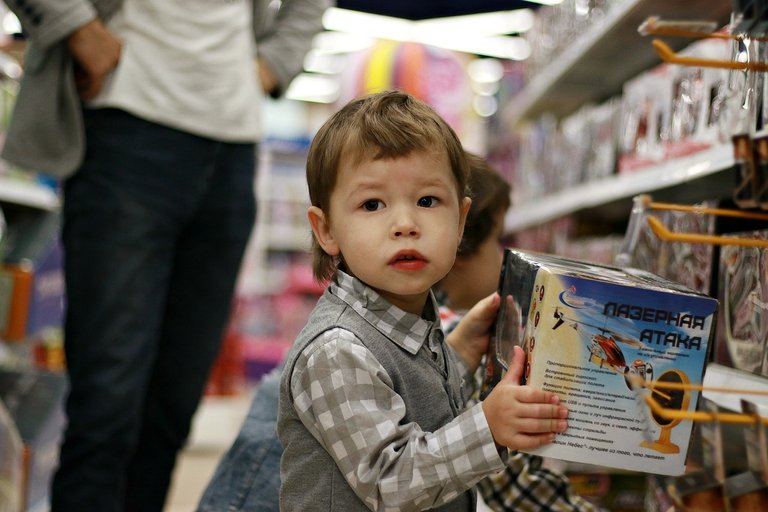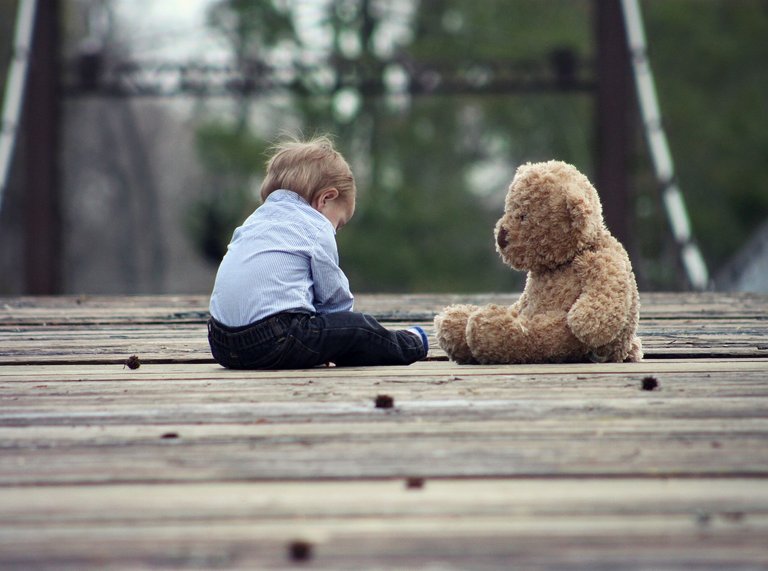Enseñar a nuestros hijos a valorar los regalos, mi experiencia [ESP-ENG]
Es un placer poder saludarlos mis queridos amigos de la Motherhood y estar nuevamente con ustedes compartiendo este hermoso espacio, desde mi corazón deseo que todas las madres, padres e hijos estén muy bien con esos seres que llenan nuestras vidas de amor y paz. Hoy quiero compartirles desde mi experiencia algo que queremos lograr como padres y es que nuestros hijos aprendan a valorar todo lo que reciben, me refiero a los regalos, algo que los llena de mucha alegría.
It is a pleasure to be able to greet you my dear friends of Motherhood and to be with you again sharing this beautiful space, from my heart I wish that all mothers, fathers and children are very well with those beings that fill our lives with love and peace. Today I want to share with you from my experience something that we want to achieve as parents and that is that our children learn to value everything they receive, I am talking about gifts, something that fills them with great joy.

Los regalos son una forma de expresar afecto, gratitud o reconocimiento a alguien. A todos nos gusta recibir regalos, recuerdo cuando era niño y mis padres me sorprendían con uno, pero también debemos aprender a darlos y a valorarlos. Y ahí está el reto que tenemos como padres, queremos enseñarles a que aprendan a valorar lo que reciben y lo que más deseamos es que su corazón aprenda a compartir con los demás, pero ¿cómo enseñar a nuestros hijos a valorar los regalos que reciben y a no darlos por sentado?
Gifts are a way of expressing affection, gratitude or recognition to someone. We all like to receive gifts, I remember when I was a child and my parents would surprise me with one, but we must also learn to give them and to appreciate them. And therein lies the challenge we have as parents, we want to teach them to learn to value what they receive and what we most want is that their heart learns to share with others, but how can we teach our children to value the gifts they receive and not to take them for granted?

Algo que me ha ayudado a enseñar a mis hijos en este aspecto, que he puesto en práctica con ellos y que me ha funcionado muy bien es con conversaciones sencillas y amenas, antes de que reciban un regalo, es hacerles reflexionar sobre lo que realmente necesitan o quieren. Con esto no intento limitar sus ilusiones, sino ayudarles a ser más conscientes y selectivos. En estas conversaciones les preguntaba qué les gustaría recibir y por qué, y también qué podrían regalar a otras personas y por qué. De esta forma les hacía pensar en los sentimientos y necesidades de los demás, y a no pedir cosas por capricho o por imitación, algo muy común en los niños.
Something that has helped me to teach my children in this aspect that I have put into practice with my children and that has worked very well is with simple and pleasant conversations, before they receive a present, is to make them reflect on what they really need or want. With this I do not try to limit their illusions, but to help them to be more conscious and selective. In these conversations I would ask them what they would like to receive and why, and also what they could give to other people and why. This way I made them think about the feelings and needs of others, and not to ask for things on a whim or by imitation, which is very common in children.

Como padres podemos llegar a la conclusión de que quizás sean demasiado pequeños para tener este tipo de conversaciones con nuestros hijos, pero pensar de esta manera puede traer aptitudes a nuestros hijos que no les favorezcan a la larga, ya que están en la edad donde se están formando en todos los sentidos y donde marcará el tipo de persona que serán de adultos. Lo importante es transmitirles que no importa si el regalo es grande o pequeño, caro o barato, lo que esperaban o no. Lo importante es que reconozcan el gesto y la intención del que regala, que expresen su gratitud con palabras, abrazos, dibujos o cartas.
As parents we can come to the conclusion that they may be too young to have this kind of conversations with our children, but thinking this way can bring aptitudes to our children that do not favor them in the long run, since they are at the age where they are being formed in all senses and where it will mark the kind of person they will be as adults. The important thing is to transmit to them that it does not matter if the gift is big or small, expensive or cheap, what they expected or not. The important thing is to recognize the gesture and the intention of the giver, that they express their gratitude with words, hugs, drawings or letters.

Explicarles que a veces los regalos no son materiales, sino que pueden ser experiencias, tiempo, atención o cariño es de suma importancia, esto es algo que en mi vida he querido transmitir a mis pequeños, ahora adolescentes, pues muchos niños llegan a sentirse muy mal e incluso a sentir frustración por no recibir un regalo en el momento que lo desean. Formar a nuestros hijos de la mejor manera es un trabajo arduo que no se logra solo hablándoles, el ejemplo siempre será nuestra mejor arma, sin él todo puede ser misión imposible, así que vernos que valoramos cuando alguien se toma la gentileza de regalarnos algo y que lo valoramos y cuidamos ayudará en gran manera a nuestros hijos.
Ayudar a mis hijos a valorar los regalos que reciben y a no esperar que nos los den no ha sido tarea fácil, pero con cariño y paciencia he conseguido que lo entiendan y, lo más importante, que sean agradecidos, generosos y felices.
Explaining to them that sometimes gifts are not material, but can be experiences, time, attention or affection is of utmost importance, this is something that in my life I have wanted to transmit to my little ones, now teenagers, because many children come to feel very bad and even feel frustration for not receiving a gift at the time they want it. Forming our children in the best way is hard work that is not achieved by just talking to them, the example will always be our best weapon, without it everything can be mission impossible, so to see us that we value when someone takes the kindness to give us something and that we value and care for it will help our children in a great way.
Helping my children to value the gifts they receive and not to expect them to give them to us has not been an easy task, but with love and patience I have been able to help them understand this, and most importantly to be grateful, generous and happy.

Banner elaborado por mí en Powerpoint 1, 2. 3, 4.
El separador fue tomado de Pixabay.
The separator was taken from Pixabay
Qué lección tan hermosa le has inculcado a tus hijos. Es muy bonito que los niños vean los regalos como un gesto de amor de parte de quien los hace y que esto los impulse también a dar sin esperar nada a cambio.
Es muy importante que menciones que los regalos no se limitan a algo material, sino que también puede ser el tiempo que alguien te dedica 💫
Excelente tu publicación 👏👏👏👏
Gracias por tus palabras amiga...
Upvote recommended by @mysteriousroad as part of Encouragement Program
Keep Up the good work on Hive ♦️
Excelente lectura, como padres muchas veces queremos dar todo lo que piden y las cosas no son valoradas porque no entienden el sacrificio que implica
Así es! Siempre debemos enseñarles a valorar y saber que hubo un gran esfuerzo.
muy bonito lo que les enseñas, un regalo debe ser algo que aprecies sin importar la cantidad o el valor económico, lo que importa es el gesto
very nice what you show them, a gift should be something that you appreciate regardless of the amount or the economic value, what matters is the gesture.
Gracias! Su valor debe ser el gesto y ellos necesitan saberlo.